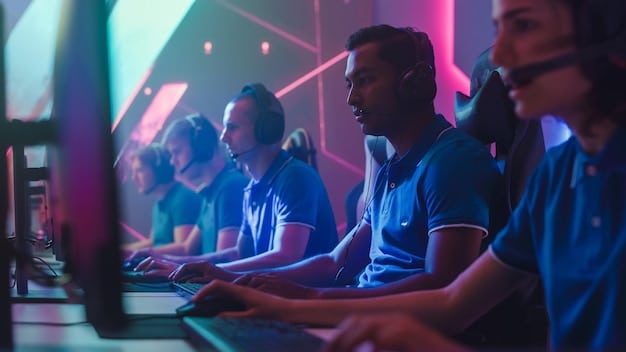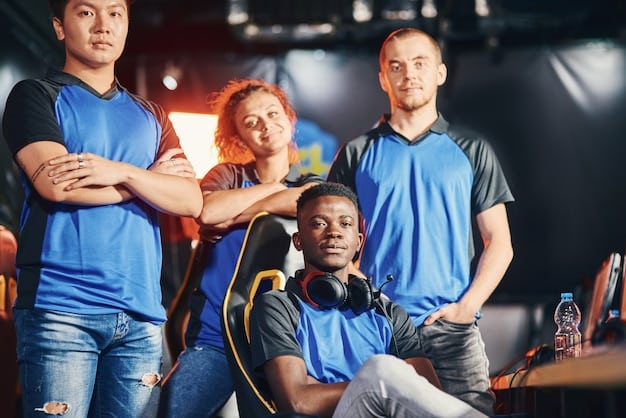New Esports Talent Scouting Initiatives Emerge in the US (2025)

New esports talent scouting initiatives launched across the US in 2025 signify a pivotal shift in identifying and nurturing the next generation of professional gamers, fostering competitive growth and revolutionizing talent acquisition strategies within the esports industry.
The esports landscape is constantly evolving, and 2025 marks a significant turning point with the introduction of new esports talent scouting initiatives launched across the US in 2025. These programs are designed to discover, train, and promote the next wave of esports stars.
The Growing Need for Esports Talent Scouting
Esports has exploded in popularity, transforming from a niche hobby into a multi-billion dollar industry. This rapid growth has created a tremendous demand for skilled players, pushing the need for structured and effective talent scouting programs to the forefront.
Traditionally, esports talent was discovered through online leaderboards, community tournaments, and word-of-mouth. However, these informal methods are becoming increasingly insufficient to meet the growing demand. New esports talent scouting initiatives launched across the US in 2025 aim to address this gap by adopting more systematic and professional approaches.
Why Traditional Methods Fall Short
The traditional methods of discovering esports talent often miss potential stars due to several limitations. For example, relying solely on online leaderboards can overlook players who perform well in team settings but may not excel individually. Similarly, community tournaments often lack the resources and reach to identify and nurture talent effectively.
- Limited Reach: Online leaderboards and tournaments often only capture players who are already highly engaged and visible.
- Lack of Structure: Informal scouting lacks standardized training and evaluation, hindering consistent talent development.
- Missed Potential: Players with raw talent but lacking exposure or resources are often overlooked.
- Geographical Bias: Scouting efforts tend to concentrate in areas with established esports communities, neglecting potential talent in underserved regions.
As esports continues to professionalize, the need for sophisticated talent scouting programs becomes more critical. These initiatives aim to level the playing field, providing opportunities for aspiring players from all backgrounds to showcase their skills and receive proper training.
In conclusion, the rise of esports highlights the necessity for structured scouting initiatives. These programs ensure a steady pipeline of skilled players, filling the gap left by traditional, informal methods and promoting a more equitable and professional esports ecosystem.
Key Features of the New Scouting Initiatives
The new esports talent scouting initiatives launched across the US in 2025 are characterized by several key features designed to ensure comprehensive talent discovery and development. These features include standardized evaluation processes, advanced training programs, and robust support systems.
These initiatives are not just about finding talented players; they also focus on nurturing their skills, providing them with the resources they need to succeed, and creating pathways to professional esports careers. Let’s explore some of the features that make these programs stand out.

Standardized Evaluation Processes
One of the key features of these initiatives is the implementation of standardized evaluation processes. This involves using consistent metrics and benchmarks to assess players’ skills, ensuring fair and objective talent identification.
These processes often include skill-based assessments, cognitive tests, and performance evaluations in simulated esports environments. By using standardized metrics, scouts can compare players from different backgrounds and regions on an equal footing.
Advanced Training Programs
Once talented players are identified, they are enrolled in advanced training programs designed to hone their skills and prepare them for professional esports careers. These programs typically include specialized coaching, strategic analysis, and physical conditioning.
- Coaching: Experienced coaches provide personalized guidance and strategic insights.
- Strategic Analysis: Players learn advanced game strategies and tactical decision-making.
- Physical Conditioning: Programs emphasize the importance of physical fitness and mental well-being.
- Teamwork and Communication: Players develop essential communication and teamwork skills.
By incorporating these features, the new esports talent scouting initiatives launched across the US in 2025 aim to provide a comprehensive and structured approach to talent development. This ensures that aspiring esports players receive the training and support they need to thrive in this competitive industry.
In summary, the new scouting initiatives are distinguished by standardized evaluations, advanced training, and comprehensive support systems. These elements collectively ensure that esports talent is not only identified but also effectively nurtured for professional success.
How Technology Plays a Role in Talent Scouting
Technology is transforming the way esports talent is scouted and developed. The new esports talent scouting initiatives launched across the US in 2025 leverage advanced technologies such as data analytics, artificial intelligence (AI), and virtual reality (VR) to enhance scouting efforts.
These technologies provide scouts with unprecedented insights into player performance, allowing them to identify hidden talent and create personalized training programs. Let’s delve into how these technologies are being used.
Data Analytics and Performance Tracking
Data analytics is playing a crucial role in identifying and evaluating esports talent. By analyzing in-game data, scouts can gain insights into players’ strengths and weaknesses, identify patterns in their gameplay, and predict their potential for future success.
Advanced performance tracking tools provide real-time data on players’ movements, reaction times, and decision-making processes. This data is used to create detailed player profiles, allowing scouts to make informed decisions about which players to recruit and train.
Artificial Intelligence (AI) in Scouting
AI is being used to automate the scouting process and identify potential talent more efficiently. AI algorithms can analyze vast amounts of data to identify players with specific skills and attributes, reducing the amount of time and resources required for scouting.
- Automated Talent Identification: AI algorithms sift through massive datasets to pinpoint promising players.
- Personalized Training Programs: AI tailors training regimens based on individual player data.
- Predictive Analytics: AI forecasts a player’s potential trajectory in the esports scene.
- Bias Mitigation: AI algorithms help reduce biases in scouting decisions, ensuring fair opportunities.
The integration of technology in esports talent scouting is revolutionizing the industry, making it more efficient, data-driven, and equitable. The new esports talent scouting initiatives launched across the US in 2025 are at the forefront of this technological transformation, paving the way for the next generation of esports stars.
In conclusion, technology, including data analytics and AI, plays a pivotal role in modern esports talent scouting. These advancements enable more efficient, accurate, and personalized approaches to talent discovery and development.
The Impact on the Esports Industry
The influx of new esports talent scouting initiatives launched across the US in 2025 is poised to have a profound impact on the esports industry. These initiatives are expected to enhance the talent pool, elevate competition, and foster a more diverse and inclusive esports ecosystem.
By providing opportunities for aspiring players from all backgrounds, these initiatives are breaking down barriers and creating a more level playing field. Let’s explore the potential impacts on the industry.
Enhancing the Talent Pool
One of the most significant impacts of these initiatives is the expansion of the talent pool. By identifying and training players who may have been overlooked by traditional methods, these programs are bringing fresh talent into the esports scene.
This influx of new talent is raising the bar for competition and driving innovation in esports strategies. As more skilled players enter the scene, the overall level of gameplay is expected to increase, leading to more exciting and engaging esports events.
Promoting Diversity and Inclusion
The new esports talent scouting initiatives launched across the US in 2025 are also focused on promoting diversity and inclusion in esports. By reaching out to underserved communities and providing opportunities for players from all backgrounds, these programs are helping to create a more representative esports ecosystem.

- Increased Representation: Diversifying the esports scene by including players from various ethnic and socioeconomic backgrounds.
- Equal Opportunity: Providing equal access to resources, training, and exposure for all aspiring players.
- Community Engagement: Partnering with local organizations to create inclusive esports communities.
- Breaking Stereotypes: Challenging stereotypes and promoting a more inclusive image of esports.
The increasing diversity of esports is not only making the industry more inclusive but also bringing new perspectives and ideas to the table. This is fostering a more vibrant and innovative esports culture that benefits everyone.
In summary, the new esports talent scouting initiatives launched across the US in 2025 are set to revolutionize the industry by enhancing the talent pool, raising the level of competition, and promoting diversity and inclusion. These impacts are expected to drive continued growth and innovation in esports, making it a more dynamic and engaging industry for players and fans alike.
Challenges and Opportunities
While the new esports talent scouting initiatives launched across the US in 2025 offer tremendous potential, they also face several challenges. Overcoming these challenges will be crucial for the long-term success of these programs.
Challenges range from funding and resources to ensuring diversity and maintaining ethical standards. However, these challenges also present opportunities for innovation and growth. Let’s explore these challenges and opportunities in more detail.
Securing Funding and Resources
One of the primary challenges facing these initiatives is securing adequate funding and resources. Esports talent scouting programs require significant investment in coaching, training facilities, technology, and marketing.
Attracting sponsorships, partnerships, and government support will be essential for the sustainability of these programs. Esports organizations, investors, and policymakers need to recognize the value of talent scouting and invest in the future of the industry.
Ensuring Diversity and Inclusion
Another challenge is ensuring that these initiatives truly promote diversity and inclusion. While many programs aim to reach out to underserved communities, it can be difficult to overcome systemic barriers and create equal opportunities for all players.
- Outreach Programs: Implementing targeted outreach efforts to engage with underrepresented communities.
- Scholarships and Financial Aid: Providing financial assistance to players from low-income backgrounds.
- Mentorship Programs: Establishing mentorship programs to support and guide aspiring players.
- Awareness Campaigns: Raising awareness about the importance of diversity and inclusion in esports.
By addressing these challenges and seizing the opportunities they present, the new esports talent scouting initiatives launched across the US in 2025 can pave the way for a more sustainable, equitable, and vibrant esports ecosystem.
In conclusion, the path forward involves addressing funding challenges and ensuring diversity and inclusion. Overcoming these hurdles will be essential for the continued success and impact of the esports talent scouting initiatives.
Future Trends in Esports Talent Scouting
Looking ahead, the future of esports talent scouting is likely to be shaped by several key trends. These trends include the increasing use of virtual reality (VR), the integration of personalized training programs, and the rise of global scouting networks.
As technology continues to evolve and the esports industry becomes more globalized, talent scouting programs will need to adapt to stay ahead of the curve. Let’s explore some of these future trends.
Virtual Reality (VR) Training and Evaluation
Virtual reality is poised to revolutionize esports training and evaluation. VR technology allows players to immerse themselves in realistic game environments, providing them with a more engaging and effective training experience.
VR can also be used to simulate high-pressure tournament situations, allowing scouts to evaluate players’ performance under stress. This provides a more accurate assessment of their potential for success in competitive esports.
Personalized Training Programs
The future of esports training will be characterized by personalized programs tailored to individual players’ strengths and weaknesses. These programs will leverage data analytics and AI to create customized training regimens that optimize players’ development.
- Adaptive Learning: Training programs that adjust in real-time based on player performance.
- AI-Driven Coaching: Personalized feedback and guidance from AI-powered virtual coaches.
- Performance Analytics: Detailed analysis of player data to identify areas for improvement.
- Remote Coaching: Access to expert coaching from anywhere in the world.
By embracing these trends, the new esports talent scouting initiatives launched across the US in 2025 can continue to innovate and drive the future of esports. These advancements will ensure that aspiring players have access to the best possible resources and training, enabling them to reach their full potential.
In conclusion, the future of esports talent scouting will be shaped by VR training, personalized programs, and global networks. Embracing these trends will drive innovation and accelerate the development of esports talent worldwide.
| Key Point | Brief Description |
|---|---|
| 🌟 New Initiatives | US launches esports talent scouting initiatives in 2025. |
| 📈 Growing Need | Demand for skilled players surpasses traditional scouting methods. |
| 🤖 Tech Role | Technology enhances scouting with data analytics and AI. |
| 🌍 Industry Impact | Enhances talent pool, competition, and diversity in esports. |
Frequently Asked Questions
▼
Esports talent scouting initiatives are programs designed to identify, train, and promote promising esports players. These initiatives often use standardized evaluation processes and advanced training techniques to develop players’ skills.
▼
Traditional methods of discovering esports talent are becoming insufficient to meet the growing demand. New scouting initiatives provide a more systematic and professional approach to identifying and nurturing talent.
▼
Technology such as data analytics and AI are used to analyze player performance, automate the scouting process, and create personalized training programs, making talent scouting more efficient and data-driven.
▼
Key challenges include securing funding and resources, ensuring diversity and inclusion, and maintaining ethical standards. Overcoming these challenges is vital for the long-term success of these programs.
▼
Future trends include the use of virtual reality (VR) for training and evaluation, the integration of personalized training programs, and the rise of global scouting networks. These trends will shape the future of esports.
Conclusion
The launch of new esports talent scouting initiatives across the US in 2025 represents a significant step forward for the esports industry. By adopting advanced technologies, promoting diversity, and implementing standardized training programs, these initiatives are set to transform the way esports talent is discovered and developed.





